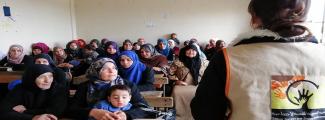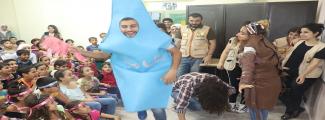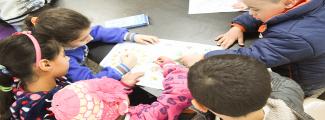Partnership between SSSD and UNHCR aims to pursue common community-based protection goals and services for the benefit of the displaced and affected population in Rural Damascus, Tartous, Homs, Hama, Aleppo, Sweida, Hasakeh, and Raqqa. This partnership will reinforce the population’s resilience to overcome the effects of the current Crisis through programs and activities.
The program includes:
- SGBV
- Child protection
- Services for the PwSN
- Education
- Community mobilization (CCs)
- Self-reliance and livelihoods
SSSD will be implementing this project in the governatrates of Rural Damascus (‘Adra, Jaramana, al-Hameh), Hasakeh (Hasakeh City, Qamishli), Sweida (Sweida City, Salkhad), Tartous (Banias, Cadmus), Homs (Quseir, al-Hosn, Sheen), Hama (Hama City, Masyaf, ShatHa), Aleppo (Ashrafieh, Sha’ar EA, Fardos, Bab al-Hadeed), Raqqa (Tabqa), focusing on:
- Implementing SGBV prevention and response activities.
- Protection of children through child-friendly spaces, community-based child protection structures, case management and targeted activities.
- Providing services for persons with specific needs through outreach program and various activities carried out in the community center, facilitating the beneficiaries’ access to psychosocial support services and activities.
- Providing remedial and catch-up classes, accelerated learning programs (ALP) and organizing summer camps for reintegration of dropout students into the public education system.
- Operating 20 community centers to act as a “service hubs” for providing a wide range of services, including community mobilization and outreach, recreational and awareness activities, CBIs and other psychosocial activities for the population of concern.
- Increasing the level of self-reliance through vocational training (VT) and other income generating activities, such as business start-up projects and training.
SSSD will implement the project activities in line with UNHCR Syria’s IDP response strategy, aimed at reducing vulnerabilities and enhancing protection through a wide range of community-based activities and targeted interventions. Focus will be retained on outreach for the identification of persons with protection-related needs. SSSD will implement this project in close coordination with the relevant UNHCR Field Offices, the sector units in UNHCR Damascus and with other stakeholders on the ground for an effective response.
The programs will provide access to services to all persons of concern to UNHCR, i.e., IDPs, host communities, as well as refugees and asylum-seekers who are registered with UNHCR (with UNHCR-issued ID cards), particularly those that are undertaken in the CCs. Regular program reporting will include information on the target beneficiaries as well, along with making efforts to reach out to the refugees/asylum-seeker communities in their catchment areas.



